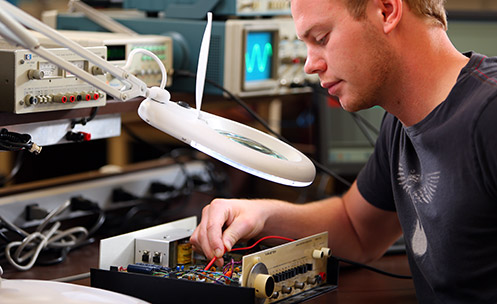
Program Information
Learn more about the Electronics Technology program.
General Help
Ask general questions at our support center.
Course Sequence
The Associate in Applied Science (AAS) in Electronics Technology program is designed to give students a foundation of experience important in electronics technicians, manufacturing supervisors, test equipment specialists, prototype fabricators, and in other positions in organizations that specialize in electronic design, manufacturing, service, and development. Students with this degree may work in industries that include, but are not limited to, aerospace, biotechnology, communications, entertainment, industrial, medical, power, semiconductor, and transportation.
Details
Important information you’ll need when applying for admission:
- Field of Interest
- Science, Technology, Engineering and Mathematics
- Type
- Associate in Applied Science (AAS)
- Academic Plan
- Electronics Technology (DEG)
- Academic Plan Code
- 3220
- Total Credits Required
- 60-68
- Catalog Year
- 2025-2026
- Effective Term
- Fall 2025
- Notes
Students must earn a grade of C or better in all courses within the program.
What You’ll Learn
This pathway map will help you gain the expertise needed to:
- Solve problems in analog electronics using basic mathematical functions, Ohm's and Kirchhoff's laws, and phasors.
- Analyze bipolar and Field Effect Transistor (FET) circuits, along with operational amplifier circuits.
- Apply the concepts of Boolean algebra to digital logic circuits.
- Interface keyboards, displays, stopper motors, and other peripheral devices to a microprocessor system.
- Program a microprocessor using low and high level programming languages.
- Demonstrate proficiency using standard electronic test equipment.
- Use contemporary operating systems and application software to solve problems in electronics.
- Design and construct an electronic circuit board and enclosure.
- Practice safe work habits according to industry standards.
- Utilize effective written and oral communication skills in accordance with the professional conventions within the field of electronics technology.
- Critically assess problems using the theoretical foundations and analytical tools of electronics technology.
- Apply relevant knowledge, skills, and habits of mind to seek career opportunities in the field.
Career Opportunities
Successful completion of this degree may lead to employment in a variety of different occupations and industries. Below are examples of related occupations with associated Maricopa County-based annual median wages* for this degree. Education requirements vary for the occupations listed below, so you may need further education or degrees in order to qualify for some of these jobs and earn the related salaries. Please visit with an academic advisor and/or program director for additional information. You can click on any occupation to view the detail regarding education level, wages, and employment information.
Electrical and Electronic Engineering Technicians
$77,726 Show expanded career information for Electrical and Electronic Engineering Technicians
Course Sequence by Term
The following is the suggested course sequence by term. Please keep in mind:
- Students should meet with an academic advisor to develop an individual education plan that meets their academic and career goals. Use the Degree Progress Report Tool in your Student Center to manage your plan.
- The course sequence is laid out by suggested term and may be affected when students enter the program at different times of the year.
- Initial course placement is determined by current district placement measures and/or completion of 100-200 level course and/or program requirements.
- Degree and transfer seeking students may be required to successfully complete a MCCCD First Year Experience Course (FYE) within the first two semesters at a MCCCD College. Courses include FYE101 and FYE103. Course offerings will vary by college. See an academic, program, or faculty advisor for details.
- Consult with your faculty mentor or academic advisor to determine educational requirements, including possible university transfer options, for your chosen career field.
Ready to get started?
Follow one of the options below to get started on your personal career pathway.
Become a Student
Click here for MCC’s easy-to-use Enrollment Steps.
Program Information
Learn more about and find contact information for the Electronics Technology program.
General Help
Ask general questions over the phone at 480-461-7400 or via online chat.
Course Area Key
Gateway Course = Generally the first major-specific course in a pathway.
Critical Course = A course that is highly predictive of future success in a pathway.
- FYC = First Year Composition
- HU = Humanities, Fine Arts, and Design
- L = Literacy & Critical Inquiry
- SB = Social-Behavioral Sciences
- SG = Natural Sciences General
- SQ = Natural Sciences Quantitative
Disclaimer
Students must earn a grade of C or better for each course listed in the Required Courses area.
Course Sequence total credits may differ from the program information located on the MCCCD curriculum website due to program and system design.
At Maricopa, we strive to provide you with accurate and current information about our degree and certificate offerings. Due to the dynamic nature of the curriculum process, course and program information is subject to change. As a result, the course list associated with this degree or certificate on this site does not represent a contract, nor does it guarantee course availability. If you are interested in pursuing this degree or certificate, meet with an academic advisor to discuss the requirements at your college for the appropriate catalog year.
View MCCCD’s official curriculum documentation for additional details regarding the requirements of this award (https://aztransmac2.asu.edu/cgi-bin/WebObjects/MCCCD.woa/wa/freeForm13?id=16453885).
Previous Catalog Years
The pathway map presented above is for the current catalog year and is the intended pathway map for new students. All previous catalog years for this pathway map are available at the link below.
Previous catalog years for Associate in Applied Science (AAS) in Electronics Technology



